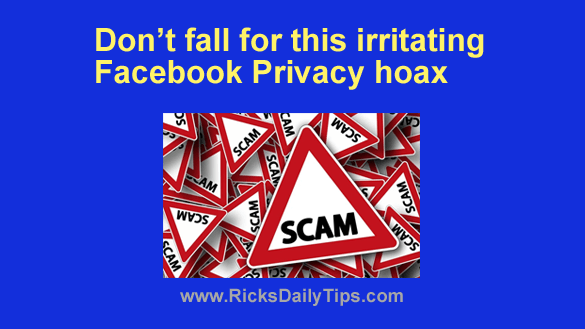 It seems that the scammers and spammers rarely take a break from their Facebook activities, and right now they seem to be working overtime.
It seems that the scammers and spammers rarely take a break from their Facebook activities, and right now they seem to be working overtime.
Every now and then a slightly new variation of the old “Facebook Privacy” hoax pops up, prompting millions of Facebook users to fall for the hoax and share it with their friends.
The latest incarnation of this hoax is actually a retread of an old one that makes the rounds several times a year. It reads something like this:
“As of May 29th at 7:29am Eastern Standard Time, I do not give Facebook or any entities associated with Facebook permission to use my pictures, information, or posts, both past and future. By this statement, I give notice to Facebook it is strictly forbidden to disclose, copy, distribute, or take any other action against me based on this profile and/or its contents. The content of this profile is private and confidential information. The violation of privacy can be punished by law (UCC 1-308- 1 1 308-103 and the Rome Statute). NOTE: Facebook is now a public entity. All members must post a note like this. If you prefer, you can copy and paste this version. If you do not publish a statement at least once it will be tactically allowing the use of your photos, as well as the information contained in the profile status updates.“
In a nutshell, the text of these posts claim that by simply placing a post like this on your Timelines you can unilaterally alter Facebook’s Terms of Service (TOS). Well, you can’t.
Facebook’s TOS is a list of rules and limitations that you agreed to when you first opened your Facebook account, and continue to agree to every time you log back in to it and use it.
You cannot change those terms simply by posting a change you’d like to see on your Timeline.
That’s sort of like trying to change the interest rate the bank charges on your mortgage simply by posting an open letter in the local newspaper. It’s not going to happen.
Scammers use some hoax posts to build the popularity of their Facebook pages by attracting lots of “Likes”, “Comments” and “Shares”.
Once the page has accumulated a lot of “authority” they can use it to post scams of a more dangerous (and more profitable) nature. Lets all try to do our part to keep that from happening.
And then there are hoaxes like this one that are simply meant to cause confusion and aggravation among the masses.
Bottom line: These “Facebook Privacy” messages are hoaxes, plain and simple. I recommend that you simply ignore them.